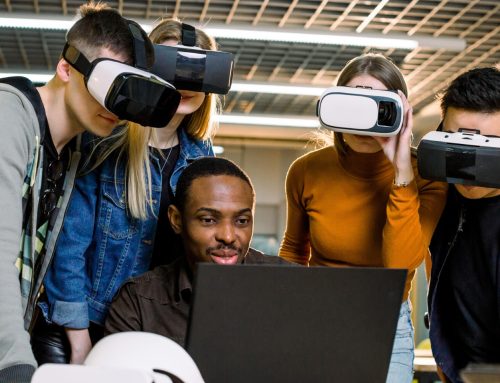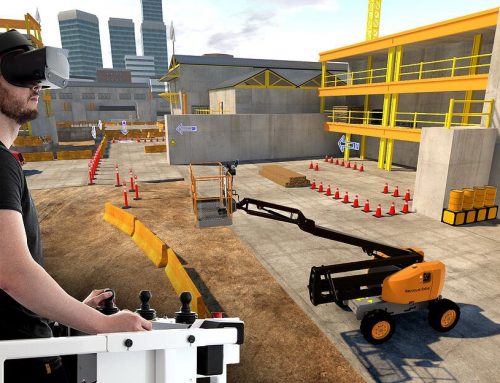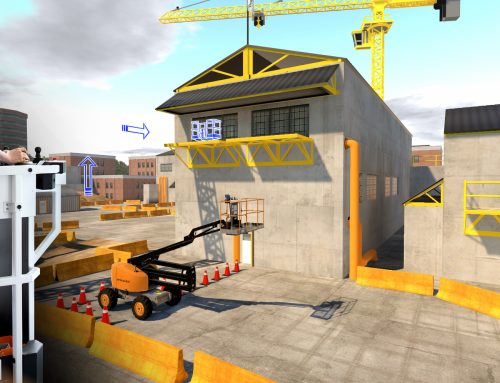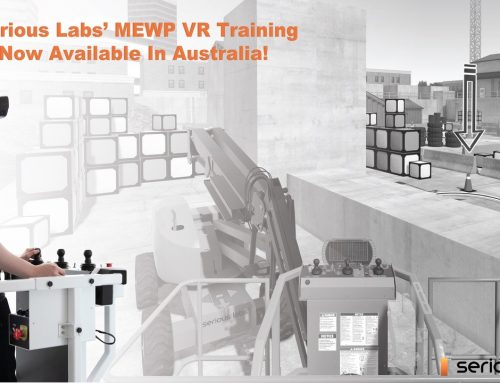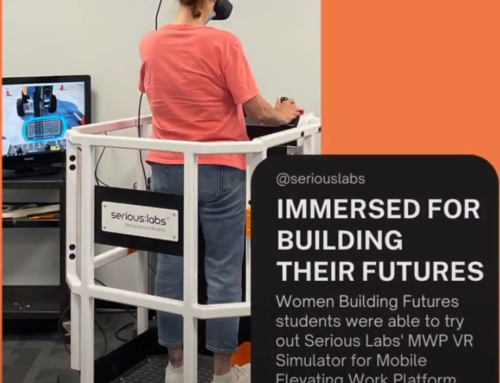Defying the Limits of Learning and Training
In the new frontier of learning and training, virtual reality (VR) is emerging as the most powerful teacher of all. VR training allows users to practice real-world scenarios in a way that traditional training environments never could. It offers all the rewards with none of the risk – scenarios can be played out safely and repeatedly as much as needed to build skills and job readiness. This allowance for judgment-free repetition leads to enhanced recall and promotes increased learning and retention.
Compared with other methods, those engaging in VR training remember at least 10% more information. Memories derived from VR experiences are stronger and last longer. “One of the greatest upsides of VR is its ability to help build strong motor memories,” explains Seamas Weech, Ph.D., a research scientist specializing in neurocognition. Weech works at Serious Labs, a leading developer of industrial VR training. We can expose our clients to training tasks that are made up of a wide range of skilled performances – whether it’s learning the order of bolts to remove from a wheel for maintenance or performing bimanual control of jibs on a boom lift.”
These skill classes require the learner to practice high-level cognitive functions, like reasoning and logic, as well as lower-level functions, like the minute coordination of arm muscles required for smooth manual control. Getting the whole package in terms of skills acquisition means building from a sound base of motor memories and reliving them in controlled settings until the high-level functions develop. Serious Labs’ VR simulators support this process from start to finish. The patterns of behavior needed to perform the task can be carried out with manual control systems (for example, real hardware from a piece of heavy equipment) integrated with a head-mounted VR display.
One excellent example can be found in Serious Labs’ Mobile Elevating Work Platform (MEWP) VR Simulator. Designed to replicate the aerial lifts widely used in construction, aerospace, and logistics, this simulator lets users take advantage of perfectly risk-free conditions to practice the most challenging tasks – where the most learning occurs – as much as desired. This supports the journey from motor memories to higher cognitive functions.
“On the neurobiological side,” continues Dr. Weech, “we know that building strong memories about the problem-space of a task requires something called ‘consolidation.’ This is where the brain organizes learned information in a way that allows it to be stored in long-term memory, ready for later retrieval.”
This physical change in the brain represents task-relevant information going from a fleeting, explicit representation (such as “I’ve been told that this is how to do it”) to a more permanent, implicit representation (i.e. “I know that this is how to do it.”) Repeat practice of tasks in VR, as opposed to non-immersive training methods, supports a smooth process of consolidation that builds longer-lasting memories. A bonus is that VR facilitates the so-called ‘encoding’ phase of memorization, because learning a task in VR mimics the way we learn tasks in the real world. In the VR space, things look and seem real to us, meaning that the brain can take advantage of existing pathways that are used to
encode memories in our daily life. “This is critical for us, as the content providers designing simulations because we get to leverage the brain’s incredible efficiency for learning complex tasks,” says Dr. Weech.
There’s an immense importance of presence for generalizing learned skills to the real world. Due to a concept called “state-dependent memory,” we know that being in the same mental mode in both the encoding and recall stages of the learning process makes for a much more efficient memory retrieval later on. In the case of operating machinery on a jobsite, it’s clear that the same mental states just won’t be engaged in non-immersive training conditions. Feeling “presence” in VR changes that completely. It means that training in immersive VR generates an unparalleled connection between the early stages of learning, and the crucial real-world execution of learned skills in the field. Serious Labs works hard to ensure that users of their VR systems achieve a state of “presence,” where it feels like their experience in VR is reality, rather than a simulation.
The virtual reality simulator for commercial vehicles developed by Serious Labs allows you to experience this. With the Alberta Motor Transport Association and leading carriers and driving schools, they are collaborating closely to ensure a product that is “by industry, for the industry.” It also addresses key transportation challenges, such as driver shortages, road safety, training costs, and greenhouse gas emissions. As a result, Alberta Transportation, Emissions Reduction Alberta (ERA), Transport Canada, and the National Research Industrial Research Assistance Program (NRC IRAP) have provided funding and support for their programming.
Serious Labs is also taking a leading role in addressing cybersickness. Persistent throughout the VR field, cybersickness various feelings of discomfort arising from the mismatch between what a user is seeing and the motion their body is feeling. Serious Labs has a continued focus on providing an experience with an unparalleled level of comfort for the user, with Dr. Weech’s research playing a prominent role.
“My past academic research shone a light on cybersickness, its causes, and mediating factors, and led to the generation of novel therapies and mitigation strategies,” he explains. “We’ve learned a great deal more through internal testing at Serious Labs, that’s given us specific insights about how to support the user’s behavior to optimize the comfort of VR exposure in our simulation products.” Serious Labs takes a multi-pronged approach to the challenge of cybersickness, enabling them to bring users into more complex, dynamic simulated environments than previous generations of simulators.
The multifaceted approach begins with incorporating perceptual models into our motion systems and understanding precisely how the movement of a motion base will be encoded in the brain. Serious Labs takes guidance from the visual neuroscience literature to ensure visual content is trimmed of features that could spark a negative response in the visual brain. The goal is to foster a state of physiological “calm” through techniques that tap into the body’s sympathetic nervous system control loops. By building comfort into the hardware, software, and user experience, Serious Labs gives its users the best chance of an excellent VR experience.
If all this sounds more like an excerpt from the latest science fiction novel than a workplace training course, think again. VR has firmly cemented itself as a game-changer in the field of learning and training. This technology has the power to train users safer, faster, and more effectively, and Serious Labs is excited to be at the forefront.


